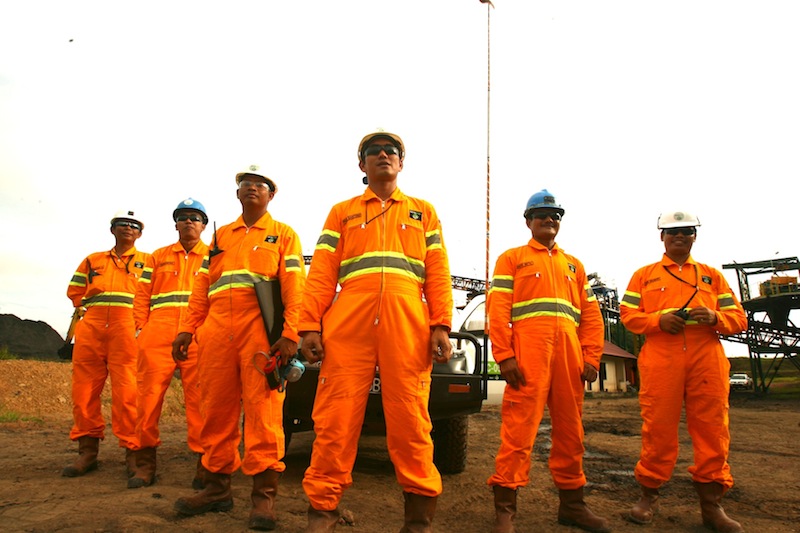The Board has established a Health, Safety, Environment and Communities Committee to develop and oversee the Company’s HSE strategy, policies and performance.
Progress in 2013
We recognise that good safety management is critical to the continuation and efficiency of our operations, in addition to the wellbeing of our employees. We are therefore pleased to report that there were no fatalities at our operations during 2013.
In 2013 a revised safety training curriculum was finalised and approved. This includes a core basic safety training curriculum for all contractors, and additional modules for supervisors and section heads and those working in more technical or specialist roles.
Training has been delivered at PT Berau’s own Samburakat training campus, and through parallel classes delivered by main mining contractors. The main focus has been on developing skills at the supervisor and section head level, with performance shown in the table below. We have also delivered basic safety training (“KMPD”) which is relevant to all staff and contractors, and have continued to deliver this during 2014.
| Safety Training Performance | Total employee / contractor population | Number of training passes | Percentage trained |
|---|---|---|---|
| KMPP (safety training module for supervisors and section heads) | |||
| Primary mining contractors | 1,346 | 948 | 70% |
| Non-mining contractors and sub-contractors | 969 | 592 | 61% |
In response to previous issues with unsafe tools and equipment, a commissioning policy was approved in 2013 which set a minimum standard for tools and equipment for both PT Berau and contractors. This has been applied to PT Berau operations, with inventories and remedial actions taken in all owned workshops, and was rolled out to contractors during 2014.
Safety reporting has been aligned to international standards with the creation of a new set of reporting definitions which the PT Berau HSE team has shared with contractors. Further training and socialisation was completed = with respect to these definitions during 2014. We continue to focus on improving the controls and processes used to gather safety data to ensure completeness of incident reporting.
Contractor engagement with respect to safety management has continued, including monthly Safety Committee meetings which are attended by representatives of contractor and sub-contractor organisations and PT Berau HSE management. All reported incidents and near misses are investigated and reported on to ensure continuous improvement in operational safety management is achieved and that any corrective actions are taken as necessary.
During 2014 safety training continued to be a key focus for PT Berau, including the delivery of the curriculum modules for specialist roles, and the continuing implementation of a “safety passport” system to ensure that individuals have the appropriate training for a given role or task. The tools and equipment commissioning procedure will be rolled out to contractors, and a team of inspectors has been trained to inspect the inventories and actions taken by contractors.
Safety performance data
We recognise the challenge of collecting complete safety performance data from a contractor operated business, and continue to work with our contractors to implement the processes and controls needed to ensure accurate and consistent information from across our operations. This is an ongoing journey for the Group and work has continued throughout the year, but it will take time for underlying contractor practices to adjust to meet these additional requirements. Any changes made that have a significant effect on the reporting of current year data will be fully explained to enable the comparability of safety data.
As noted in previous reports, there are differences between the definitions used by the Indonesian government for safety reporting and those that are commonly used by international mining companies. For example, Indonesian reporting only considers a fatality which occurs within 24 hours of the original incident and only requires reporting from operational mining areas, which excludes any shipping operations.
During 2013, PT Berau focused on ensuring that the data gathered from contractors and its own operations can be used to meet both local Indonesian government requirements and international reporting standards. As a result:
- A new set of definitions have been issued and presented to contractors, and internal reporting templates have been amended to reflect this change.
- Additional controls have been designed to ensure the capture of lost time incident reporting, including communication with local medical providers and hospitals.
- Working hours information is now collected from all contractors across the business under consistent definitions.
- The PT Berau HSEC directorate has been reorganised to include a role that is dedicated to reviewing data and reporting.
During 2013, PT Berau recorded no fatalities (2012: none) and one lost time incident (2012: six), which resulted in a lost time incident frequency rate of 0.02 (2012: 0.15). The all injury frequency rate was 1.57 (2012: 2.34). This data includes PT Berau employees and contractors. Our frequency rates are expressed per 1,000,000 working hours. This information is largely provided by our contractors.
In total, the number of near miss incidents (including property damage and fire cases) decreased by 17 incidents from 652 (2012) to 635 (2013). This in the context of over 13,000 staff and contractors working across the mining operation.
Analysis shows that the three main locations of accidents and near misses are workshop (20%), access road accidents (19%) and exploration (16%). The results of the investigation of road incidents show that the main causes are fatigue, speeding and taking short-cuts.
During 2014, our focus was to improve safety performance by studying the effectiveness of existing safety programmes, including inspections, patrols, PT Berau manager-led safety talks, observation programmes and the section head capability programme that are currently running.
The Group is committed to contributing to local and regional development to benefit the communities affected by its operations. PT Berau continues its contribution through employment, provision of infrastructure and assets for public use as well as community development projects. The implementation of the Group Practice Guide is underway through creation of local standard operating procedures.
